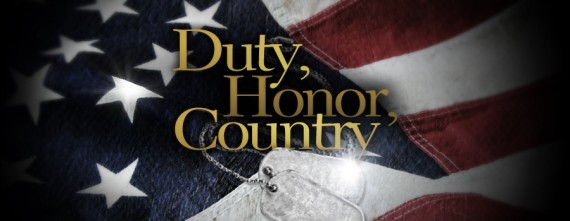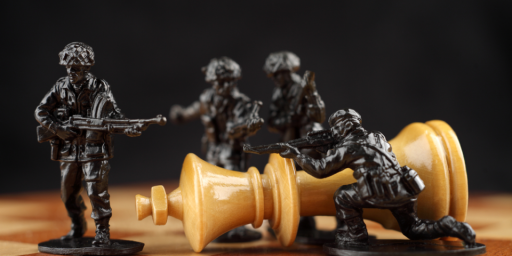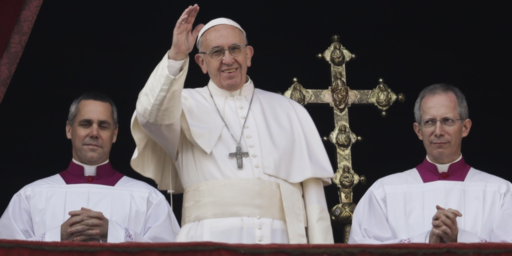Soldiers and Priests: A Contrast in Professional Ethics
My latest for The National Interest, "The U.S. Military's Ethics Crisis," has posted.
My latest for The National Interest, ”The U.S. Military’s Ethics Crisis,” has posted.
The setup:
Military officers behaving badly have been making headlines. But, rather than a sign of widespread corruption, the fact that they’re being caught and disciplined is an indication of how seriously the profession takes its ethical responsibilities.
The hook:
Few professions have anything like this level of screening and training for character. The only analog that occurs to me, the Roman Catholic priesthood*, is instructive.
Like military officers, Catholic priests are required** to have a bachelor’s degree and extensive follow-on education. Typically, priests have a master’s degree in divinity, with extensive coursework in ethics and moral philosophy, prior to ordination. The American military, by contrast, maintains extensive professional education for its officers throughout their careers, with most getting master’s degrees some time in their second decade of service.
The overwhelming number of officers and priests alike are credits to their chosen calling, performing exemplary public service and upholding the highest moral standards. In both cases, however, some fall short; some, spectacularly so. And, because the standards are so high and the uniforms of their profession make them so identifiable as a group, the public scrutiny that comes from these failures is not only high, but reflects on the whole.
Two observations come from the comparison.
First, it would seem that no amount of screening for character or training in the rules of moral behavior is sufficient to ensure that every single member of a very large group lives up to the standard. Some people will do the wrong thing even when they’re trained to know what the right thing is. Some will be able to rationalize their bad behavior. Others will simply prove weak in the face of temptation. Others still may simply be hard-wired for evil.
Second, while there are certainly exceptions, the instinct of the military brass has been to identify and punish the transgressors, even if doing so embarrasses the profession in the public eye, while the instinct of the Catholic hierarchy was to try to hide the problem to protect the image of the Church. Why Church acted as it did is complicated and, in any case, beyond my expertise. But the opposite reaction of the military profession is worth highlighting.
[…]
Now, the “Washington Post Test” is a good one. As both leaders of people who put their lives on the line for their country and stewards of the taxpayers’ money, flag and general officers ought to be above reproach, avoiding even the appearance of impropriety. But it’s worth noting that they’re being held to a much higher standard than not only their civilian commander-in-chief, the Members of Congress with oversight responsibility over the armed forces, and their private sector counterparts. Presidents, Congressmen, and corporate executives routinely mix business and pleasure, going on trips to nice locations with minimal business to do and taking their families along.
Indeed, The Pentagon’s General Counsel’s Standards of Conduct Office regularly publishes The Encyclopedia of Ethical Failures, a huge volume cataloging in minute and sometimes humorous detail indiscretions committed by uniformed and civilian employees of the Defense Department. Aside from the sheer stupidity of some of the perpetrators, what quickly stands out is that DoD employees are often punished quite severely for conduct that wouldn’t draw a second glance in the private sector.
The conclusion:
It’s a good thing, indeed, that the military’s civilian and uniformed leadership is taking this recent spate of ethical lapses seriously. Constant vigilance and scrutiny is good for the profession. But it’s worth keeping in mind how ingrained in the culture they already are.
There’s quite a bit more in between; the piece is nearly 2000 words.






My, my. Good points. As a church employee, I’m caught in the backlash. Throughout the country, thousands of man-hours are spent in “Safe Church” classes where we are told- what? Don’t be evil? Don’t do that? That’s wrong? Um, as long-standing church members, aren’t we supposed to know that already?
@John Peabody: Yup. If you don’t know not to molest children of your own accord by the time you’ve hit adulthood, much less finished seminary and gotten a graduate degree in moral philosophy, you’re likely a lost cause.
On the other hand, the strengths that come from a high level of cohesion, identity, and professionalism can turn into weaknesses if the group is not vigilant. Distrust and/or derision of the outside world, defensiveness to criticism, the tendency to circle the wagons, and other dynamics of insularity can lead to negative behavior. The priesthood may have fallen prey to those forces.
Well, you’re setting a pretty low bar.
But I’ve seen the same argument made for bicycle racing.
I think your comparison of the Catholic Church and the Officer’s Corps is overdrawn. If you look at how the Catholic Church handles abusers today, or in the last decade, and compare that to the military, I do not believe you will find that big a difference. Most of the priest abuse scandals I recall involved incidents that happened 30-40 years prior to the disclosure of the abuse. I do not believe there is any question that the Church was operating then under a totally different mindset than it does today.
I wonder how much the structure of religion contributes to the mentality of the priests, in terms of their views of the people outside the organization.
I know for a fact that even though Christians are supposed to minister to the fallen, they too often view them with a healthy amount of distrust, even hostility. It could contribute to fostering an “us-against-the-world” mentality that produces a strong compunction to look the other way from in-house transgressions.
James — I can’t imagine the military viewing the civilian “plebs” with the same amount of distrust, but I don’t know many people ingrained in the military culture. Could it be that this lack of distrust contributes to more rigor in prosecuting wrongdoings?
@Mike: Sure. But it took decades to get there. Military culture has long been to hold officers accountable.
@James Joyner:
Well, there are a few examples of failure in that regard, James. Tailhook leaps to mind. While the events in 1991 were the ones that gained notoriety, the bad behavior was little different from previous Tailhook symposiums. The difference being, of course, that offenders were actually held accountable.
It seems to me that my time in the Navy, mid-70s through mid-90s, was much more characterized by not holding offenders accountable, the lack of accountability growing with the offender’s seniority. If there was a way to get them off the hook (no pun intended), it was pursued vigorously. The only area where accountability was eagerly pursued was illegal drugs, and there again, seniority (primarily meaning junior officers, as opposed to junior enlisted) often provided a path around accountability.
From my perspective, accountability in the post-Vietnam military came of age with the Tailhook scandal. Prior to that, it was more important to “take care of your own” instead of punishing failures to meet ethical standards.
Mumble. I would say that the scandal of child abuse in the Church (and their unwillingness to do anything about it), has been paralleled by the scandal of sexual assault in the military and THEIR foot-dragging to do something about it.
One officer cheating is tragic, a group of two or three officers behaving in concert in this manner is freaking heartbreaking and disgusting – they were acting in a way that was entirely and exactly at odds with everything that they were trained to do and what was very explicitly expected of them. There is no way to square this ethically or morally. Everyone involved knew they were in the wrong, and if found out, would destroy their careers.
But 92?
Seriously? 92 people? 92 COMMISSIONED OFFICERS, fer gawd’s sake?
That is not 92 individuals effing up individually and breaking their oath and behaving unethically on their own. This is systemic. This is a top-to-bottom and bottom-to-top failure. A peer group decided that it was okay to circumvent the rules and their oath. You do not get 92 people to do anything in concert unless there is sociological pressure to do so. At some level, this was known, and it was allowed to continue and grow and metastasize. A sociological cancer. A get-along / go-along moral test that EVERYONE failed.
The only reason we know about the Malmstrom nuke cheating scandal because it was fallout from the drug trafficking arrests.
Not one of the 92 came forward on their own. Not one.
We only found out about the cheating because one of the 11 involved in the drug thing wanted a chit to plea bargain with. This does not make me confident in the system; it makes me very worried.
@Boyd and @grumpy realist: : I think the Tailhook scandal, and to a lesser extent the recent sexual assault scandals, are an indication of something else: a culture slow to adapt to the integration of women. Hell, even as an outsider (albeit a recent junior Army officer), I thought Tailhook was mostly just “boys being boys” at the time. Our attitudes have shifted slowly.
But the Navy has long been about accountability, sometimes pedantically so. The tradition of firing the skipper when anything goes wrong, even if there was no reasonable way that it was his fault, has been around forever.
@de stijl: I address that in the piece. I see that as a system where a zero defects culture essentially forced people to cheat, making it seem normal. It has apparently been the norm for quite some time in that sub-community.
@James Joyner:
Operationally, this is quite true. Ethically? Ehhhh, not so much (prior to 1991).
As I mentioned in my earlier comment, recreational drug use always seemed to get a pass when it was a JO, same as DUIs (this pass also extended to senior enlisted), and sexual misconduct was certainly condoned (and even privately lauded in many cases).
No one was forced to cheat. The situation was not normal and everyone involved knew it wasn’t normal.
It was a get along / go-along wink-wink thing. Everyone knew they were breaking the rules and breaking their oath at some level no matter what they told themselves. Career breaking shit. And yet no one came forward. Self reporting mechanisms failed entirely.
I know that you feel that you’re addressing the issue, but it’s a bigger deal than you’re allowing in your piece. We’re addressing the one issue we know about and assuming that bottom-up self-reporting mechanisms will take care of the rest even though those measures failed entirely in the past.
@James Joyner:
It’s often struck me that in many professions: doctors, lawyers, elected officials; people are often removed or punished for ethical failures. Seldom for performance. A doctor or lawyer may lose business, but not be removed from practice except for obvious, gross incompetence. If Thomas Ricks’ in The Generals is to be believed, that’s also true in the higher reaches of the Army. His case is that during WWII under Marshall (and earlier, as under Lincoln) generals were relieved wholesale (often without destroying careers) and the Army was better for it. But in Korea, Iraq, Afghanistan, and most egregiously Vietnam, poor generals were left in place, resulting in higher casualties and failed missions. Ricks says we don’t fire the skipper anymore, at least in the Army. For ethical failings, maybe. For incompetence, no.
@James Joyner: ” I thought Tailhook was mostly just “boys being boys” at the time. Our attitudes have shifted slowly.”
Note that Tailhook was a government paid bacchanalia, with the officers (but not gentlemen!) feeling free to line up and grope any women coming out of the elevators.
@Boyd:
Please consider amending your sentence to “Prior to the AF Global Strike Command’s discovery of a month ago that proctors were texting answers to readiness tests, it was more important…
The assistant AF secretary investigating the issues at the four missile bases testified that taking care of each other to ensure 100% passage was “part of the wingman mentality” but that was a nice way to say what you so starkly state: Take Care of Your Own, rules.
@Mike: I wish you were correct about old scandals versus present day in the Catholic Church but I think that very little has actually changed in the religious hierarchy. Witness PA. Within the past couple of years the Bishop has shuffled molesting priests from one parish to another and only a secular criminal investigation bought it to light. What has changed? Parents taking more of an active role in the parish and keeping the priests the hell away from one on one interaction with the kids. And significantly more willingness by police and prosecutors to go after the men in the black dresses. But the Church itself is still corrupt down to its core.
@gVOR08: Ricks is comparing apples and oranges. Prior to WWII, we had a tiny, cadre force that we ramped up to massive proportions. Generals, especially 2-star division commanders, were often incredibly green. So, a high failure rate was a given. Nowadays, there’s no such thing as a general officer with less than twenty-five years of service.
@James Joyner: I’m pretty sure Ricks would disagree. In fact did disagree, in considerable detail. He cites many examples of long service officers who proved less than competent in Vietnam, also Iraq and Afghanistan. Long service breeds careerism, which can be an enemy of competence.
Did you feel all of your superior officers were exemplary? Maybe a few you worried about?
Ricks has a line to the effect that amateurs talk strategy, professionals talk logistics, but real experts talk personnel policy. And he has a very low opinion of current Army personnel policy.
@gVOR08:
Well, not exactly. He demonstrates that some officers made mistakes, judged in hindsight, in conflicts where the American Way of War weren’t applicable.
Only one of my senior officers that I know of made general. Peter Vangjel, who as a major was my battalion executive officer, is currently the 3-star Army Inspector General. He was an exemplary officer.
I’ve got problems with the policies as well, as I’ve noted in several posts over the years. Most notably, there’s little way for the very best to move rapidly ahead. But I’m hard pressed to think of an industry where those at the very top are as consistently stellar as in the Army, or the US military in general.
@James Joyner:
Talking about something and “addressing” it are two separate things. For example, I’ve talked about the Malmstron AFB nuke officer scandal, but I really haven’t addressed it. Nor have you.
Reciting the facts isn’t “addressing” the issue.
Deploring the situation isn’t really “addressing” it.
Acknowledging that it is a problem isn’t “addressing” it.
I am as guilty of this as anyone.
@de stijl: To “address” something is to “speak to” it. I believe I”ve done that in this paragraph:
This wasn’t an article about this particular scandal—which the military leadership immediately acknowledged and started to work on when it came to their attention—but I don’t see how I’ve failed to address it.
@MarkedMan: Not picking on you MM, but you know what I find interesting? How nobody cared about abuse in the Catholic Church until it was a priest slipping it to little boys. How people still laugh at the abuse meted out by nuns in the name of “discipline”. (think Blues Brothers). Well, as one who still fights the demons Sister Kathleen left me with I wonder how it is that every body was shocked, SHOCKED I tell you, that Priests were doing these things.
We weren’t shocked. We knew it and we told each other to watch out for “Father Paul”. But when it came to the nuns? Everybody knew, KNEW EXACTLY what was going on, and didn’t do a damn thing about it. That’s why we never told anyone about Father Paul. Why bother, they already knew about Sister Kathleen and weren’t doing anything about it. They didn’t care. They didn’t care about Father Paul either.
So I find the outrage to be rich with irony.
@OzarkHillbilly: I’m sorry for the abuse you received at the hands of the nuns. I spent twelve years in Catholic schools and my parents grew up in Ireland so I follow that pretty closely. I have no illusions whatsoever that nuns are angels. That said, extreme lifestyle choices attract people at the extremes. If all I had to go on was my experience at my grade school which was principled by an angry bitter and twisted nun, I would have no respect for the religious. But I also had four years of high school with the Marist Brothers and I found that as a whole they were an admirable group. Priests, on the other hand, strike me as a whole lot of man-boys.
Obviously, I wasn’t as clear as I should have been. That’s my fault. I hope that this is:
Talking about and / or deploring an issue doesn’t really address the issue – it acknowledges it. Acknowledging a problem is just the first step of addressing a problem.
You undeniably acknowledged the ethical problems. Your solution seems to be that people should use reporting mechanisms that already existed but failed to prevent the ethical problems you’re deploring.
Does advocating for more of same really address the problem?
@OzarkHillbilly: I think that’s more because it’s still considered acceptable to hit kids in the name of discipline. And if a teacher does it? Just walloping sin out of the little devil.
A lot of the more fundamentalist sects still approvingly cite the “spare the rod and spoil the child” mantra–and act on it. Some of the punitive garbage that gets put out by authors of those beliefs is pretty horrifying.
@James Joyner:
That’s the point in a nutshell. General officers had been trained to fight The American Way of War. They were in a situation in Vietnam in which that was ineffective and they couldn’t adapt.
@James Joyner:
Regrettably, at a JO level there is no relationship with a battalion XO that would invite knowledge of any impropriety unless it couldn’t be contained.
In general, if there is a fall guy, it isn’t the highest on the totem pole. Only time I see the top fall is when there is conclusive irrefutable evidence that the top covered up misconduct within the ranks. And then the top is usually allowed to drop retirement papers and earn at least a 60% retirement on 90k. I have yet to see evidence that this is extended to enlisted.